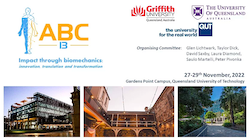Designing Molecular Glues 2023 Virtual, Virtual
Hetero-bifunctional protein degraders like proteolysis targeting chimeras (PROTACs) have found their way into the clinic by utilizing the body’s natural disposal system to tag and degrade unwanted proteins implicated in various diseases. These degraders are large molecules consisting of a E3 binding ligand and a ligand binding the target protein, coupled together by a linker. On the other hand, monovalent degraders or molecular glues consist of a single degrader molecule that attaches to both the E3 ligase and target protein and tend to be smaller and more drug-like. These glues have been discovered serendipitously in the past, however recently, there are efforts being made to try and design them more rationally. Cambridge Healthtech Institute’s inaugural virtual conference discusses some of these innovative design strategies and screening methods to discover and optimize molecular glues for therapeutic purposes. The conference features live talks given by experts and includes online discussions for active networking and idea-generation.
Coverage will include, but is not limited to:
Monovalent degraders versus hetero-bifunctional degraders like PROTACs
Strategies for rational design of molecular glues
Screening methods and cellular assays for glue discovery
Applications for molecular glues beyond protein degradation
Advances and challenges in developing molecular glues as therapeutics
![]()
#Glues23
◑ Topics | Categories
- Applied Science
- Biodesign
- Biological
- Biological Science
- Biology
- Cell
- Characterization
- Chemical
- Chemistry
- Design
- Developers
- Development
- Digital
- Discovery
- Drug
- Event
- Events & Meetings
- Health
- Health & Medicine
- Healthcare
- Human
- Innovation
- Innovation and Design
- Manufacturers
- Manufacturing
- Medical
- Medical Science
- Medicine
- Natural Science
- Processing
- Production
- Programming
- research symposium
- Science
- Science and Technology
- Scientific
- Scientists
- Techniques
- Technologists
- Technology
- Tissue
- Tissue Engineering
- Tissue Repair
- Virtual Conference
- Webinar
Advertisements









 Speakers
Speakers  Call for Papers
Call for Papers  Event Schedule
Event Schedule  Go to Event Website
Go to Event Website